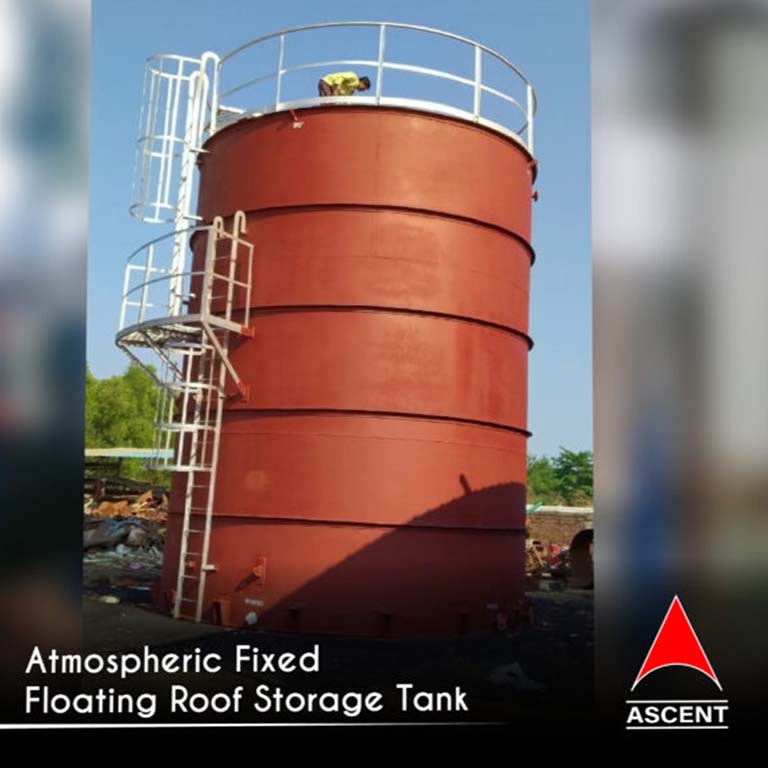
Home > Product Range > Industrial Process Equipment > Static Process Equipments > Atmospheric Fixed / Floating Roof Storage Tank
Atmospheric Fixed and Floating Roof Storage Tanks are essential equipment for storing large volumes of volatile and non-volatile liquids, including crude oil, petroleum products, chemicals, and water. Designed to minimize evaporation losses and ensure operational safety, these tanks offer efficient and environmentally friendly storage options. Their robust construction, versatile configurations, and advanced sealing mechanisms make them indispensable for industries such as oil and gas, chemicals, and energy.
Ascent Machineries & Engineering Services Ltd., headquartered in Goregaon, Mumbai, India, is a leading manufacturer, supplier, and exporter of high-quality atmospheric fixed and floating roof storage tanks. With a presence in over 80 countries, we deliver innovative, tailored solutions that meet international standards, ensuring durability, efficiency, and environmental compliance.

These storage tanks are engineered to handle atmospheric pressure, providing safe storage for a wide range of liquids under varying conditions.
| Model | Capacity (Liters) | Material | Price (₹) |
|---|---|---|---|
| Compact Storage Stack | 1,000–10,000 | Carbon Steel | 5,00,000 |
| Standard Tower | 50,000–1,00,000 | SS304 | 20,00,000 |
| High-Capacity Storage Tank | 5,00,000–10,00,000 | SS316 | 1,00,00,000 |
Market Comparison:
Floating roof designs effectively reduce product evaporation.
Durable materials and coatings ensure longevity
Includes emergency vents, flame arrestors, and robust seals.
Complies with environmental standards for emissions.
Tailored to meet specific storage requirements.
Robust construction minimizes downtime and servicing needs.
| Parameter | Details |
|---|---|
| Capacity | 1,000–10,00,000 liters |
| Material Options | Carbon Steel, SS304, SS316 |
| Roof Types | Fixed Roof, Floating Roof |
| Sealing Mechanism | PTFE, Viton Gaskets |
| Operating Temp | -20°C to 100°C |
| Pressure Range | Atmospheric or slight pressure |
| Coatings | Anti-Corrosive, UV-Resistant |
| Country of Origin | India |
Cost-effective solutions for non-volatile liquids.
Ideal for reducing evaporation in volatile liquids.
Enhanced safety and reduced emissions for volatile liquids.
Efficient for large-scale liquid storage.
Cities: Mumbai, Delhi, Chennai, Bangalore, Dubai, Kuala Lumpur, and more.
Countries: India, UAE, Malaysia, South Africa, Kenya, UK, USA, Australia, and Vietnam.





Floating roof tanks minimize vapor losses, making them ideal for volatile liquids.
Yes, we provide tailored solutions, including material and design adjustments.
Delivery timelines range from 6 to 10 weeks, depending on specifications.
Ensure safe and efficient storage with Ascent Machineries & Engineering Services Ltd.‘s premium atmospheric fixed and floating roof storage tanks. Contact us today for customized solutions tailored to your industrial needs.
ASCENT MACHINERIES & ENGG. SERVICES Shop No. 2, 1st Floor, Nalanda Shopping Center, Station Road, Goregaon West, Mumbai - 400062, Maharashtra, India
+919819063898
sales@ascentmes.com
© 2025 Ascentmes.com. All rights reserved. Designed by Vebiotic Web Solutions Marketing by Adinads